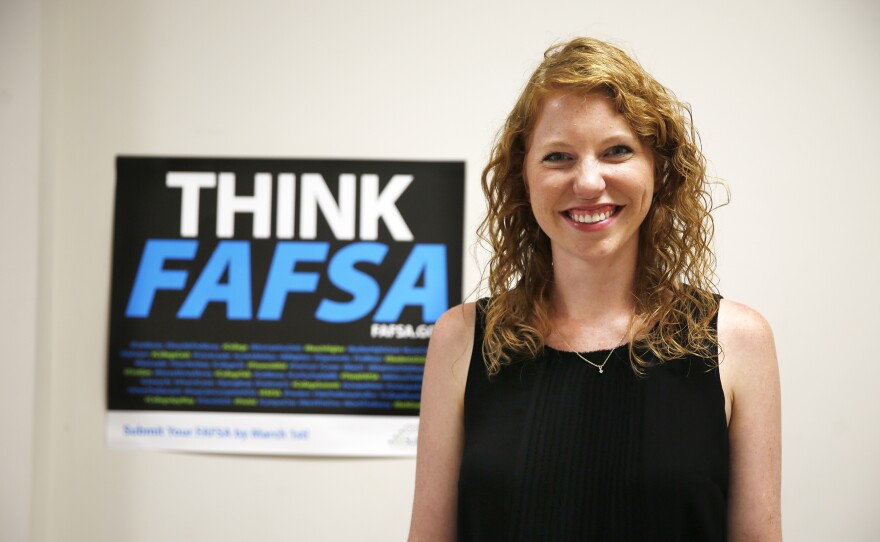
When the Obama administration announced last year that it would overhaul the Free Application for Federal Student Aid, or FAFSA, prospective college students (and their parents) cheered.
"Today, we're lending a hand to millions of high school students who want to go to college and who've worked hard," said Arne Duncan, who was at that time U.S. Secretary of Education. "We're announcing an easier, earlier FAFSA."
And it is both.
Earlier because it's now available to students in October instead of January.
Easier because most students can now use their parents' prior-prior year tax data, which means they can use the IRS' data-retrieval tool to automatically answer some of the form's toughest tax questions.
So why do many students still have trouble finishing the FAFSA?
Ask Margaret Feldman. She's the director of college advising with the Scholarship Fund of Alexandria in Virginia, and she's based at T.C. Williams High School. There she helps students step-by-step through the FAFSA process.
Last year, I spent a day with Feldman, watching several teens struggle through the old FAFSA. Recently, I went back to hear how they're handling the new one.
I watched four students attempt to complete the form. Two brought a parent with them. Just one student finished. This is just some of what I heard:
Glitchy Website
"Periodically, the FSA ID website crashes ... and makes you exit the browser and start again," says Feldman, moments after such a crash forces senior Dontae Hibbert and her father, Lucian Hibbert, to restart.
The FSA ID is a relatively new requirement for FAFSA applicants. It's meant to verify the identities of students and parents and to prevent fraud, but it's also labor-intensive for many teens.
Oh No, Typo
"If you have to ever change the name, the date of birth or the social security number, we resubmit and then we have to wait one to three days to log back in to the FSA ID account," Feldman says, consoling the Hibberts after Dontae mistyped Lucian's birthdate. The typo scuttles their FAFSA effort for the day.
Moving Pieces
"One of the main hurdles with completing the FAFSA is just the number of steps that students have to go through and the different moving pieces that are required from parents and students. So, getting them in the same place with all of the information that they need to actually fill out the FAFSA in one sitting is pretty tricky," Feldman says after the Hibberts fail to finish.
The Family
"You've never been to court and separated from your dad?" Feldman asks one student as she helps her through the FAFSA's many questions.
"Wait, I was separated, but by my mom, though. They went to court and fought for my custody. So do I put Yes?" the student asks, genuinely confused.
For some students who live in more traditional families, this sort of question is a no-brainer. But for many teens it can be a brick wall.
Phone Home
"She's not answering," laughs senior Devin Butler as he tries calling his mother. He needs her to check her e-mail and verify her identity.
Feldman says it's not uncommon for students to have to call their parents, seeking answers for tough questions.
The Family, Pt. 2
"Household is you and Dad," Feldman says, leaning over a student's shoulder.
"Um, but we do live with my uncle and aunt," the student says.
"Household always includes you and the parent that you live with and then it includes your parents' other children, if your dad provides 50 percent or more of their financial support. ... For your uncle, does he support himself?"
"Yeah, he supports himself."
"Then we wouldn't count him."
"So, I would put three? Since [My dad] doesn't have custody of my little brother, but he does pay for most of his stuff?"
Phone Home, Pt. 2
"Me puedes dar tu social security, ahorita?" one student says to her father after having to call him. He doesn't remember his social security number, and the student cannot finish the FAFSA without it.
Taxes Still Matter
"Do you have your wife's tax return?" Feldman asks Ahmed Conteh, a father who came to Feldman's office to help his son, Al Nagib.
"We have to contact her. She's got everything," Conteh says.
Because Conteh and his wife filed their taxes separately, they're not able to use the IRS' data-retrieval tool. So, even though Ahmed has his tax records in-hand, Al has to put the FAFSA on hold until they can get his mother's tax data, too.
When The IRS Helps, It Helps
"Hey, there we go!" Devin Butler cheers as he successfully uses the IRS' data tool to automatically answer the FAFSA's toughest tax questions.
"All the numbers we need," Feldman says, relieved. Devin would finish a few minutes later.
Even Parents Need Help
"How's it feel?" I ask Lucian Hibbert after Feldman tells him that he and his daughter will have to wait at least a day or two to finish the FAFSA.
"Bad," he says, laughing. "I was hoping it could be finished today."
Copyright 2016 NPR. To see more, visit http://www.npr.org/.






